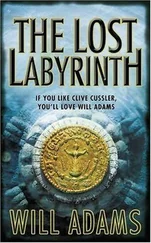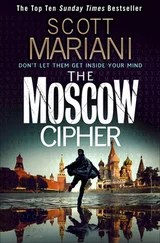Will Adams - The Alexander Cipher
Здесь есть возможность читать онлайн «Will Adams - The Alexander Cipher» — ознакомительный отрывок электронной книги совершенно бесплатно, а после прочтения отрывка купить полную версию. В некоторых случаях можно слушать аудио, скачать через торрент в формате fb2 и присутствует краткое содержание. Жанр: Прочие приключения, на английском языке. Описание произведения, (предисловие) а так же отзывы посетителей доступны на портале библиотеки ЛибКат.
- Название:The Alexander Cipher
- Автор:
- Жанр:
- Год:неизвестен
- ISBN:нет данных
- Рейтинг книги:5 / 5. Голосов: 1
-
Избранное:Добавить в избранное
- Отзывы:
-
Ваша оценка:
- 100
- 1
- 2
- 3
- 4
- 5
The Alexander Cipher: краткое содержание, описание и аннотация
Предлагаем к чтению аннотацию, описание, краткое содержание или предисловие (зависит от того, что написал сам автор книги «The Alexander Cipher»). Если вы не нашли необходимую информацию о книге — напишите в комментариях, мы постараемся отыскать её.
The Alexander Cipher — читать онлайн ознакомительный отрывок
Ниже представлен текст книги, разбитый по страницам. Система сохранения места последней прочитанной страницы, позволяет с удобством читать онлайн бесплатно книгу «The Alexander Cipher», без необходимости каждый раз заново искать на чём Вы остановились. Поставьте закладку, и сможете в любой момент перейти на страницу, на которой закончили чтение.
Интервал:
Закладка:
Knox straightened out and roared off toward Sharm. He shook his head at himself. He'd done it now. He'd fucking done it. He needed to reach his Jeep before Hassan or Nessim could put the word out. If they caught him… Christ! He felt sick at the prospect of what they would do. He needed out of Sharm, out of Sinai, out of Egypt altogether-and he needed out tonight. He glanced around and saw Fiona sitting on the bench seat at the back, head bowed, teeth chattering, a blue towel wrapped tight around her trembling shoulders. For the life of him, he couldn't think how she had reminded him of Bee. He slammed the heel of his hand against the control panel in anger at himself. If there was one thing he hated, it was memory. You worked your balls off to build a life in a place like this that had no links whatever with your past-no friends, no family, nothing to weigh you down. But it wasn't enough. You took your memory with you wherever you went, and it would fuck you up in a heartbeat. IBRAHIM BEYUMI walked Mohammed down to the street to wish him farewell, then thanked him for reporting his find at the building site and watched him disappear around the corner of the street.
Maha, his assistant, started to rise when he returned upstairs, but he settled her with a palm, then went to consult the vast street map of Alexandria pinned to the wall behind her. As ever, it filled him with wistful pride, marked as it was with every antiquity in his beloved city, including Pompey's Pillar, Ras el-Tin, the Latin Cemeteries, the Roman theater, Fort Qait Bey. There were some fine sites among them, and he boasted vigorously about them to anyone who would listen, but he knew in his heart that none of them were in the first rank of Egyptian antiquities. Alexandria boasted no pyramids, no Karnak or Abu Simbel, no Valley of the Kings, despite the fact that two thousand years ago its buildings had been something to marvel at. The Pharos lighthouse had been one of the Seven Wonders. The Mouseion had led the world in learning and culture. The Temple of Serapis had awed worshippers with its splendor and the trickery of its flying statues. The Royal Palaces of Cleopatra were imbued with extraordinary romance. And most of all, the city had boasted the mausoleum of the city's patriarch, Alexander the Great himself. If just one of these great marvels had survived, Alexandria would surely now rival Luxor or Giza on the tourist trail. But none had.
"That man," said Ibrahim.
"Yes?"
"He's found a necropolis."
Maha looked around. "Did he say where?"
"In the old Royal Quarter." Ibrahim traced out the approximate area with his finger, then tapped its heart. Remarkably, it was impossible to be sure of the outlines of the ancient city, let alone the position of a particular street or building. Alexandria was virtually surrounded by water, with the Mediterranean to the north, Lake Mariut to the south and west, and the marshy Nile Delta to the east, limiting its room for growth. When new buildings had been needed, therefore, old ones had simply been torn down to make way for them. Fort Qait Bey was built on the ruined foundations of the Pharos lighthouse. And the limestone blocks of Ptolemaic palaces had been reused for Roman temples, Christian churches, and then Islamic mosques, mirroring the various ages of the city.
He turned to Maha with a storyteller's smile. "Did you know that Alexander marked out our city's walls himself?"
"Yes, sir," she replied dutifully but without looking up.
"He leaked a trail of flour from a sack, only to have birds of all colors and sizes come feast upon it. Some people might have been put off by such an omen. Not Alexander."
"No, sir."
"He knew that it meant our city would provide shelter and sustenance for people from all nations. And he was right. Yes, he was right."
"Yes, sir."
"I'm boring you."
"You said you wanted these letters out today, sir."
"I do, Maha. Indeed I do."
Alexander hadn't lived to see his city built. It had been Ptolemy and his progeny who benefited, ruling Egypt with gradually diminishing authority until the Romans took over, themselves displaced by the Arab conquest of AD 641. The administrative capital had been transferred south, first to Fustat, then to Cairo. Trade with Europe had fallen off; there was no longer such need for a Mediterranean port. The Nile Delta had silted up; the freshwater canals had fallen into disuse. Alexandria's decline had continued inexorably after the Turks took control, and by the time Napoleon invaded at the turn of the nineteenth century, barely six thousand people lived here. But the city had since proved its resilience, and its harbors had come back to life, thanks to a boom in Mediterranean trade, so that today some four million souls were packed together into high-density housing that rendered systematic excavation impossible. Archaeologists like Ibrahim, therefore, were at the mercy of developers, who were still tearing down old buildings to erect new ones in their place-and every time they did so, there was a glimmer of a chance that they would uncover something extraordinary.
"He did describe one area in great detail," he said. "A forecourt with bronze doors leading to an antechamber and main chamber. What do you make of that?"
"A tomb?" hazarded Maha. "Ptolemaic?"
Ibrahim nodded. "Early Ptolemaic-very early." He took a deep breath. "Indeed, it sounded to me like the tomb of a Macedonian king."
Maha stood and turned, her fingers splayed on her desk. "You can't mean…," she began. "But I thought Alexander was buried in a great mausoleum, not an underground necropolis."
Ibrahim remained silent for several seconds, vicariously enjoying her excitement, wondering whether to deflate her gently now or risk sharing his wilder hopes. He decided to let her down. "He was, yes. It was called the Sema; the Greek word for 'tomb,' you know. Or perhaps Soma, their word for 'body.' "
"Oh," said Maha. "So this won't be Alexander's tomb, then?"
"No."
"What is it?"
Ibrahim shrugged. "We'll need to excavate to find that out."
"How? I thought we'd spent all our money."
And that was the nub. Ibrahim's entire budget for the year was already allocated, and he'd begged as much from the French and the Americans as they could give. It happened like that here, precisely because excavation was such an opportunistic affair. If too many interesting sites were found in the same financial period, he simply couldn't handle them all. It became a matter of triage. At this precise moment, all his field archaeologists were involved, directly or indirectly, in projects across the old city. Excavating this new site would demand new money, specialists, and crew. And it wasn't as if he could put it on hold until the next financial year. The stairwell was slap in the middle of the new hotel's prospective parking lot; Mohammed could accommodate a couple of weeks of excavation, but any more would ruin his schedule. That was a real concern to Ibrahim. In uncovering ancient Alexandria, he depended almost entirely on property developers and construction companies to report significant finds. If ever he got a reputation for causing excessive delays or being difficult to work with, they'd simply stop notifying him, regardless of their legal obligations. In many ways, this latest site was a headache he didn't need. But it was also an early Macedonian tomb, quite possibly a very significant find indeed, so he couldn't let it slide by.
There was one possible source of funds, he knew. His mouth felt tacky and dry just thinking of it, not least because it would mean contravening all kinds of SCA protocols. Yet he could see no alternative. He forced a smile. "There's that Greek businessman who keeps offering to sponsor us," he said.
Maha raised her eyebrows. "You can't mean Nicolas Dragoumis!"
Читать дальшеИнтервал:
Закладка:
Похожие книги на «The Alexander Cipher»
Представляем Вашему вниманию похожие книги на «The Alexander Cipher» списком для выбора. Мы отобрали схожую по названию и смыслу литературу в надежде предоставить читателям больше вариантов отыскать новые, интересные, ещё непрочитанные произведения.
Обсуждение, отзывы о книге «The Alexander Cipher» и просто собственные мнения читателей. Оставьте ваши комментарии, напишите, что Вы думаете о произведении, его смысле или главных героях. Укажите что конкретно понравилось, а что нет, и почему Вы так считаете.












